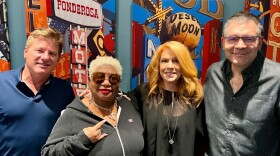Justin Favela is best known as a prominent Las Vegas artist. Now his horizons are expanding in several ways.
His work will be showing at the Denver Art Museum beginning February 19. Favela is one of 13 artists who are part of the exhibition, "Mi Tierra: Contemporary Artists Explore Place." Favela created the installation, "Fridalandia."
"I’ve re-created Frida Kahlo’s garden from the 2002 movie “Frida,”" he told KNPR's State of Nevada, "It’s like this Hollywood piñata version of Frida Kahlo’s Casa Azul courtyard. And then, I’ve also appropriated the paintings of Jose Maria Velasco. In the tradition of a lot of Mexican muralists, I’ve made these big, big murals that kind of surround the gallery in nature."
Favela and his friend Emmanuel Ortega co-host the podcast, "Latinos Who Lunch."
Favela and Ortega join us in the studios of Nevada Public Radio.
DISCUSSION HIGHLIGHTS:
On how the podcast got started:
Ortega: “We always found ourselves at coffee shops talking about these different topics, sometimes it would get very heated and sometimes it would get very funny and finally Justin said let’s just do it in a podcast,”
Favela: “I love listening to podcasts and I was always looking for Latino voices out there and there wasn’t many of them. Finally, I just got the equipment and started our own thing”
On what they talk about:
Favela: “The election was a big topic for us. Sometimes we talk about our favorite movies. We talk about our issues with health. One of my favorite episodes we did was a music episode where we choose our favorite music of 2016”
On why they talk about personal topics:
Favela: “I think it’s important to talk to your friends about issues out loud and Babelito is my best friend. So this is something you would normally talk about. When I stress out, I binge eat. And that’s what we talked about on the show.”
On whether what they talk about extends to the whole Latino community:
Ortega: “We don’t want to be the voice of the Latino community. In fact, one of the missions that we set out in the beginning is not just to complain about the problems in the Latino community but highlight the complexities of it and the history of it. That’s one of the things we try to do, but we don’t restrict ourselves to a specific script.”
Favela: “When you keep it personal, it’s relatable and it’s not just to Latinos. It is to everybody else.”
On who their audience is:
Ortega: “I thought for a long time because of the responses on social media that it was mostly women between 25 and 35 but we noticed that we have all kinds of listeners from 18 to 65. I used to have a picture of who I was talking to but not anymore because it just keeps growing and growing every month. “
Favela: “We’re talking to ourselves here. It’s two friends having a conversation. Remember not to make blanket statements. We’re not talking to an audience. We’re having a conversation.”
On whether they're concerned about alienating listeners by discussing cultural issues and appropriation:
Ortega: “I do think about it. I call out everybody. We call out our own culture at the same time. We had an episode about how not everybody calls themselves in the Chicano community brujas and brujos – witches – what it stems from and what does it mean and how annoyed we are by it.”
Favela: “There is a difference between wearing a costume and appreciating a culture and loving a garment you got in Mexico. To pay homage or to condemn. People don’t really think about that.”
On the reaction to the podcast:
Favela: Mostly positive. Thankfully right now. I think the more popular it gets the more trolls we’re going to have and I’m so excited about that. I’m ready for it!
On what they hope people get out of the podcast:
Ortega: One of our goals in the podcast, I want to create interruptions in peoples days. That if you are wearing something that you’re appropriating that culture, you’re listening to us, maybe you’re going to keep wearing it but at least now you’re thinking about it. That’s all I’m looking for.
Favela: I’m always advocating for other Latino podcasts and Latino voices. We don’t need to give voices to other people. They already have voices. I’m looking to amplify those voices. I think that "Latinos Who Lunch" is a great platform for that.
From Desert Companion: Making their voices heard
Justin Favela, artist and co-host of the "Latinos Who Lunch" podcast; Emmanuel Ortega, co-host of the "Latinos Who Lunch" podcast










